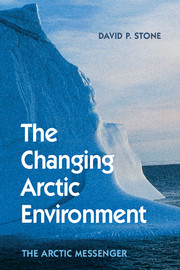Book contents
- Frontmatter
- Dedication
- Contents
- Acknowledgements
- Acronyms
- 1 Personal Beginnings
- PART I THE CHANGING ARCTIC
- 2 The Arctic Messenger
- PART II WORKING TOGETHER
- PART III WHAT IS THE PRESENT STATE OF KNOWLEDGE?
- PART IV WHAT DOES ALL THIS MEAN?
- Appendix I The Intergovernmental Panel on Climate Change (IPCC)
- Appendix II What Will Happen in the Future If We Do Nothing or If We Try Very Hard to Aggressively Reduce GHG Emissions: Projected Change Under Different Emission Scenarios
- Appendix III Some Geophysical Background Notes Related to Climate and Weather
- Appendix IV Orbital Forcing
- Appendix V The Concept of Commitment
- Bibliography
- Credits
- Index
2 - The Arctic Messenger
from PART I - THE CHANGING ARCTIC
Published online by Cambridge University Press: 05 February 2015
- Frontmatter
- Dedication
- Contents
- Acknowledgements
- Acronyms
- 1 Personal Beginnings
- PART I THE CHANGING ARCTIC
- 2 The Arctic Messenger
- PART II WORKING TOGETHER
- PART III WHAT IS THE PRESENT STATE OF KNOWLEDGE?
- PART IV WHAT DOES ALL THIS MEAN?
- Appendix I The Intergovernmental Panel on Climate Change (IPCC)
- Appendix II What Will Happen in the Future If We Do Nothing or If We Try Very Hard to Aggressively Reduce GHG Emissions: Projected Change Under Different Emission Scenarios
- Appendix III Some Geophysical Background Notes Related to Climate and Weather
- Appendix IV Orbital Forcing
- Appendix V The Concept of Commitment
- Bibliography
- Credits
- Index
Summary
More dangerous is my whisper than the roar of a hundred men … Dáithí Ó h Ógáin, “Harsh Words Spoken” from
Footsteps From Another WorldThe phrase “Arctic Messenger” is taken from a conference held in Copenhagen in May 2011 and organised by the Arctic Monitoring and Assessment Programme (AMAP), the University of Copenhagen and Aarhus University. In this book, I imagine the Arctic Messenger as a living entity– a harbinger that possesses omnipotent consciousness. It is of enormous age and experience, akin to the Sumerian Utnapishtim or the biblical Methuselah. Our messenger is able to tell us about its (the Arctic's) well-being and to warn us that in the past, the global ecosystem has always been astonishingly sensitive to geophysical changes in the Arctic.
This chapter takes a quick look at the breadth of environmental issues that are eroding the Arctic that was and the Arctic that is now. It is therefore an introduction to the Arctic Messenger and a rough summary of what is to come in later pages. I hope it will tempt you to read on.
About 10–13 million people live in the entire Arctic region. Between 1.5 million (Arctic Council Indigenous Peoples Secretariat) and 0.4 million (United Nations Permanent Forum on Indigenous Issues) are indigenous. The Arctic environment is their home, their source of food and the foundation of their culture and spirituality. It is part of an extended soul that binds atavistically through their ancestors into the deep past and outwards into the living world. It is a psyche that outsiders can admire and respect but never acquire. Arctic indigenous peoples are, quite simply, an intimate part of their natural Arctic ecosystem. However, they do not enjoy an existence disconnected to the rest of the globe, and for the last 60 years, they have faced an incremental tide of environmental dangers flooding from the industrial world.
- Type
- Chapter
- Information
- The Changing Arctic EnvironmentThe Arctic Messenger, pp. 11 - 20Publisher: Cambridge University PressPrint publication year: 2015



